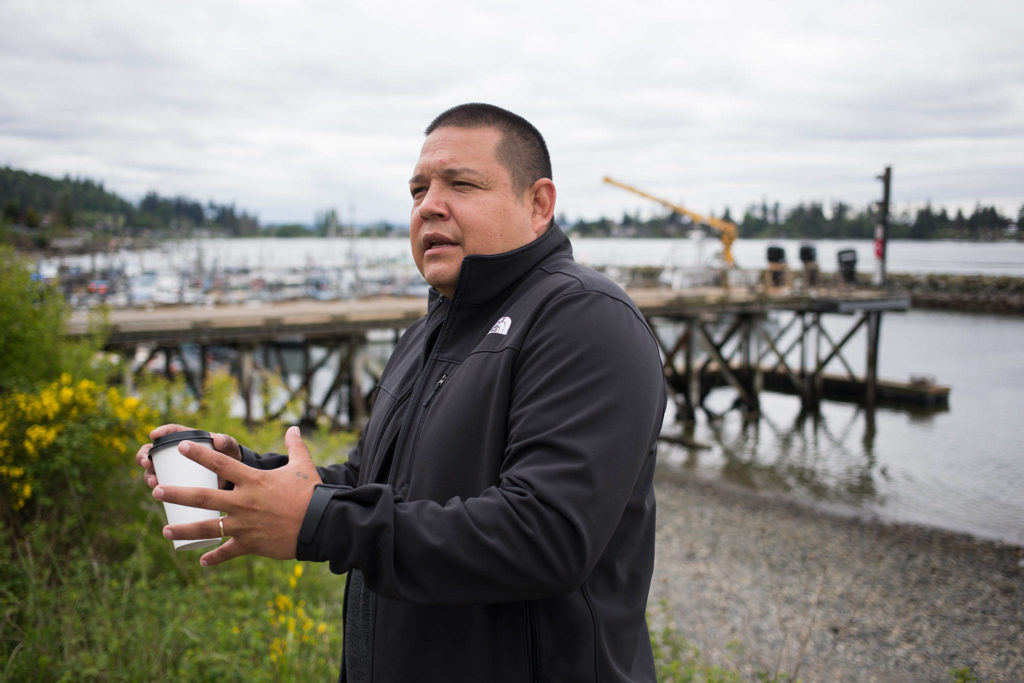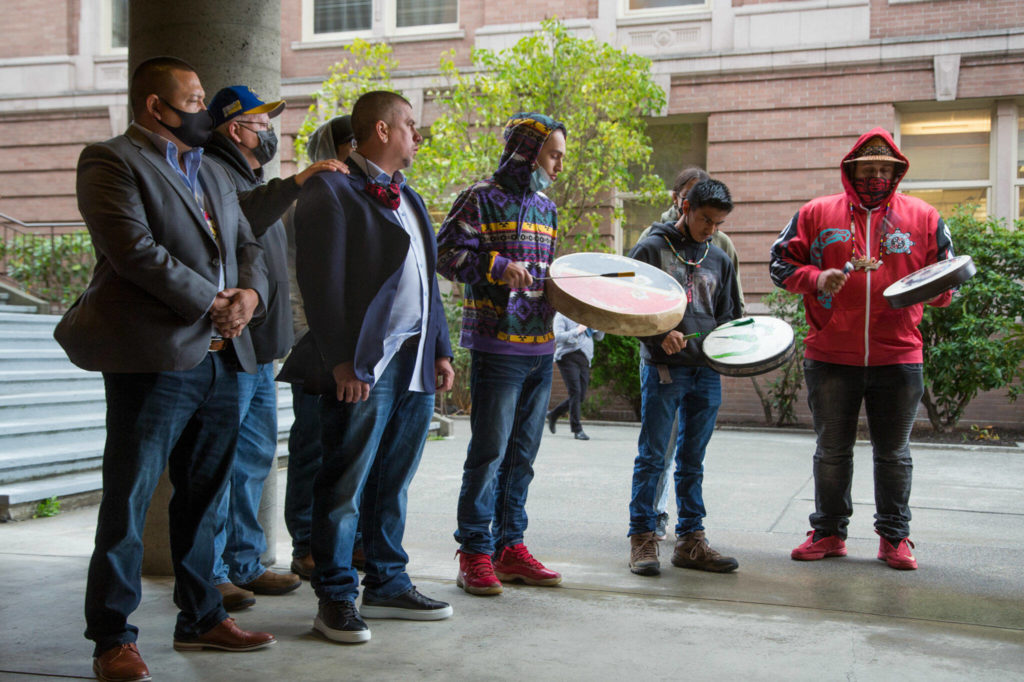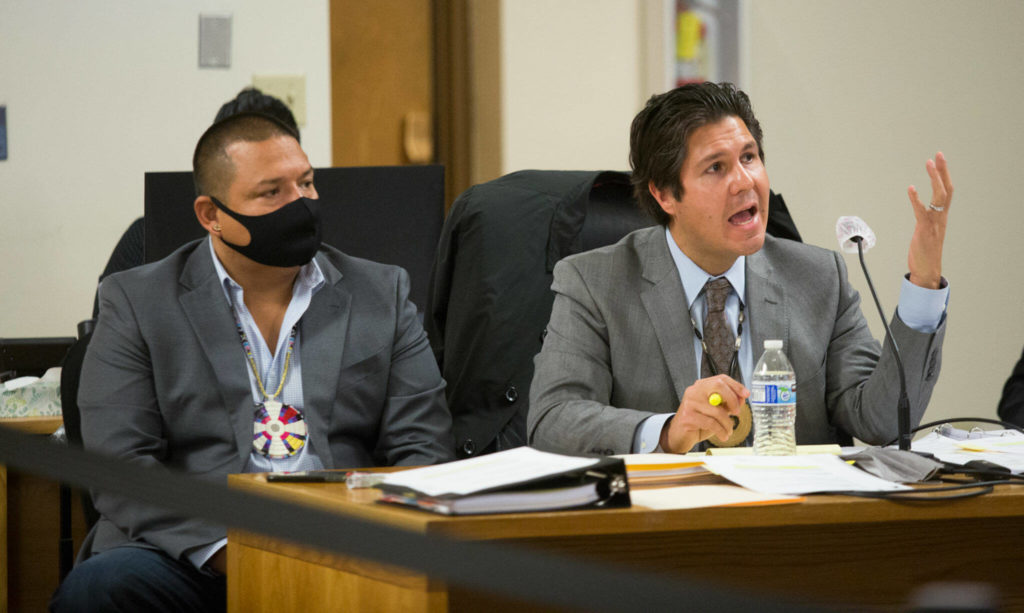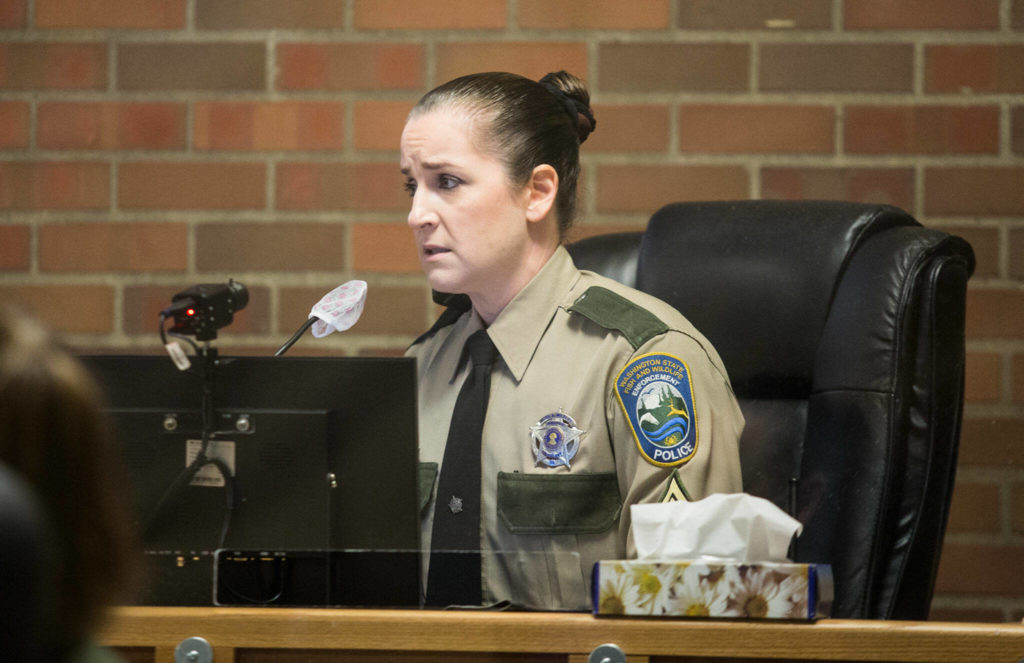TULALIP — A day before a trial pitting tribal treaty rights against state law enforcement, a Skagit County Superior Court judge dismissed felony charges against a Tulalip council member and another tribal member who, in turn, accused the state of targeting Native American fishermen.
Hazen Shopbell, 40, a tribal board member elected in 2020, ran a multimillion-dollar wholesale fish business with Anthony Edwin Paul, 43. Both were charged in 2018 with two counts of unlawful shellfish accounting and three counts of shellfish trafficking in the second degree.
In court pleadings, the defendants claimed state Fish and Wildlife detectives racially profiled and harassed them, and last year they settled an unlawful arrest lawsuit for $50,000. Their lawyers accused the state of violating treaty rights, too.
The state argued its officers did everything within the bounds of law.
Skagit County deputy prosecutor Rosemary Kaholokula argued the defendants’ state-issued business license gave the court jurisdiction in their case.
Judge Brian Stiles on Monday disagreed, saying the allegations in question reportedly took place on the Tulalip Reservation, involving clams purportedly harvested on traditional tribal lands, bought by a business owned by tribal members.
Defense attorney Gabe Galanda called Stiles’ ruling a “complete vindication” of the Treaty of Point Elliott of 1855, which laid out protections for hunting and fishing rights of tribal members in the Puget Sound region.
In Washington, at front of mind are the “Fish Wars” of the 1960s and ’70s, when the late Billy Frank Jr. fought for treaty rights on the Nisqually River. Those protests led to the Boldt decision of 1974, a federal court ruling affirming the rights of Washington’s tribes to fish in accustomed places, and giving them the chance to take up to 50% of harvestable fish.
Another federal judge bolstered that decision decades later when he applied it to the harvest of shellfish, in what’s now called the Rafeedie Consent Decree.
In court Monday, Stiles said his ruling was “consistent with the heart of the treaty and Rafeedie Consent Decree.”
“This court shouldn’t be involved in those issues,” he said.
Shopbell told a Daily Herald reporter that he sees his prosecution as another chapter of the Fish Wars. He worried a guilty verdict would have established case law and encouraged the state to pursue charges against other tribal members. Accepting a plea deal was never in the cards.
“It’s a fight we’ve been fighting for centuries,” he said.
Galanda said the dismissal had implications for tribal members throughout the state.
“To me it establishes a precedent … to stop specious investigation and prosecution of tribal members engaged in treaty fishing activities,” Galanda said. “This was a massive waste of taxpayer dollars over the last six years.”
‘Reverse racism’
Shopbell, a longtime general contractor, grew up on the Tulalip Reservation. He first got the idea to become a fish buyer when he was a kid. He recalled going fishing with his mother and grandparents, who often complained they couldn’t get much money for their catch.
When buyers roll up to the docks in their trailers during the frenzy of fishing openers, it’s a rare sight to see enrolled tribal members among them, Shopbell said. Having representation matters, he said — it keeps “other buyers honest.”
Paul, who has lived most his life in Pierce County, started his career as a blackjack dealer at the Emerald Queen Casino. He went on to operate three smoke shops on the Puyallup Reservation, a venture that got him in trouble with the IRS, and prison time.
He also bought and sold real estate, worked as a fisherman and diver, and ran a seasonal fireworks business.
When Shopbell and Paul partnered to create Puget Sound Seafood Distributors, they planned to buy only from tribal fishers. It would be true to the adage that “rising tides lifts all canoes,” Galanda wrote in court papers. Through their business, they claimed, tribal fishermen could sell crabs at double the usual price or more.
The business lasted less than 2 years. Puget Sound Seafood fell as swift as it rose.
In 2015, then Fish and Wildlife detective Wendy Willette, now a sergeant, took part in a separate shellfish poaching investigation when she learned the suspects in that case allegedly sold product to Shopbell and Paul. She later testified that Puget Sound Seafood’s paperwork did not match the checks it paid to fishermen.
There were inconsistencies, Shopbell and Paul later explained, because they fronted bait to fishermen and subtracted that cost when they bought the catch.
In her case notes, Willette pondered why Puget Sound Seafood was trying to “monopolize the Tulalip crab industry” and whether it was “a ruse to launder money for … other exploits like fireworks or cigarettes.”
At one point she talked to a competing fish buyer. In her notes from that interview, Willette wrote he mentioned “reverse racism,” which defense attorneys later argued showed their clients were targeted because they were Native American.
Fish and Wildlife law enforcement Chief Steve Bear said in a statement Tuesday that the department and tribal co-managers “take the protection of natural resources seriously.”
“Our jobs require us to investigate and document apparent violations of law and submit them to prosecutors and the courts,” Bear said. “This does not mean that every charge and every case that gets referred leads to a successful prosecution.”
Bear explained fish dealing licenses and their associated laws and rules help track natural resource products from harvest to consumer and provide confidence in the safety and sustainability of seafood.
“Both WDFW and regional tribes strive to maintain healthy population levels of fish and shellfish species in Washington while providing a safe and healthy food source to its residents,” he said.
Willette’s investigation took the better part of two years and more than 30 search warrants. Between 2015 and 2016, her report alleged, Shopbell and Paul directed one of their employees to buy at least a couple tons of hardshell clams that weren’t harvested in accordance with state or tribal seasons. And according to Willette, they allegedly told the employee not to fill out fish receiving tickets, as required by state law.
The crabs were not for humans to eat, but they weren’t labeled or dyed to indicate as such, as required by law, according to court documents. Furthermore, the employee reported, the clams were given to her in laundry baskets and buckets, which Willette noted was “inconsistent with legitimate shellfish harvest practices.”
“Typically, legally-harvested bivalve shellfish are bagged in mesh sacks, of uniform weight, and tagged with (Department of Health) Certification Tags,” Willette wrote.
The employee, who is not a tribal member and who was not charged in the case, acknowledged the practice was different when she bought clams from the Swinomish Tribe. There, harvested bait clams were dyed at the beach and tagged appropriately.
The defendants’ attorneys contended their clients’ clams were harvested at Cama Beach, within the tribes’ usual and accustomed areas.
‘Outlandish, outrageous, unprofessional’
Authorities served search warrants on the homes of Shopbell and Paul on June 13, 2016, the day of the crab opener, a lucrative time for the tribes.
The same day, officers arrested Shopbell and Paul at the Everett Marina. According to a lawsuit the pair later filed against Fish and Wildlife in King County Superior Court, the two men spent two hours in the back of a patrol car before detectives let them go.
Shopbell and Paul claimed Fish and Wildlife officers “orchestrated the baseless arrests and detentions” to coincide with the crab opener. As a result, they argued, they lost out on tens of thousands of dollars.
In settling, the state did not admit liability.
“I believe the statements in that lawsuit were nonsense,” Willette, the detective, later testified.
Shopbell and Paul accused Willette of “prosecutorial shopping,” calling her “relentless in her quest to find a county willing to file charges.”
The detective approached Snohomish, King and Pierce county prosecutors, as well as the state Attorney General’s Office and the Tulalip Tribes, before Skagit County took the case.
Charges were filed in Skagit County Superior Court on June 5, 2018. But a year later, prosecutors appeared to hit a wall when Judge Stiles prevented them from entering destroyed bait clams as evidence.
Fish and Wildlife detectives had used sledgehammers and shovels to pry the frozen bait clams out of totes at a cold storage facility in Burlington, damaging some. They took pictures and took a sample — four bags, 15 clams, one of which was dyed — and threw out the rest in the Skagit County dump, according to court documents.
Defense attorneys argued the detectives had effectively thrown out over a thousand pounds of evidence that could have proved their clients’ innocence. They could have tried tracing the clams to where they were harvested and determined whether they were legal, they suggested.
Stiles sided with the defendants. But prosecutors challenged that ruling at the state Court of Appeals, where they argued the defense was merely speculating about how the clams could have been traced.
Judges there reversed Stiles’ decision, calling the destroyed clams “only potentially useful to the defense.” That was not enough to suppress the evidence, the court ruled, unless it was destroyed in bad faith.
The case went back to Superior Court. In testimony at an October hearing, Willette said it was common practice to keep only a representative sample of the evidence. The state doesn’t have the capacity to store that many clams, she said, and they posed a public health risk if they weren’t controlled correctly.
“They are a huge liability,” she said.
Willette also commented on the “unordinary amount of tactics” the defense attorneys employed to avoid trial.
“There have been a number of tactics in this case,” she said, “that have been outlandish, outrageous, unprofessional, and frankly we’ve never seen before, in regards to Fish and Wildlife violations.”
‘They ruined lives’
At the heart of the debate is whether Fish and Wildlife detectives violated tribal treaty rights.
On Aug. 8, 2018, then-Tulalip Chairwoman Marie Zackuse sent a letter to Fish and Wildlife, stating the department had violated “the spirit and intent” of agreements between the tribes and the state regarding enforcement.
“Given that the facts of these cases revolve around tribal fisherman and treaty fishing activity, we believe these matters are within the purview of the Tulalip justice system,” Zackuse wrote, on behalf of the Tulalip Tribes.
She explained the tribes don’t condone clam harvest violations, “but we also don’t believe a bait clam violation rises to the level of a felony or that WDFW should be attempting to exercise State jurisdiction in this matter.”
Northwest Indian Fisheries Commission director Justin Parker shared a similar sentiment.
“From our standpoint, it appears WDFW is focusing its enforcement efforts against tribal members who typically do not have the resources to defend themselves,” Parker wrote the department director in October.
Willette said she had worked with Tulalip police throughout her investigation.
Despite dismissal of the criminal charges, Puget Sound Seafood Distributors is no more. Their very public arrests at the marina, Shopbell and Paul said, ruined the business overnight. No one trusted them anymore. They lost important relationships and had to sell assets to pay for lawyers. They said they became stressed and depressed in the six years they had to deal with the investigation and the prosecution.
Neither has any intention of going back into fish buying. But as a tribal board member, Shopbell said, he wants to protect tribal fishing rights.
Paul, on the other hand, said he’s still “in debt up to my eyeballs.”
“They ruined lives — you’re talking six years — for crab bait,” he said.
Last month, in a separate case, a federal judge sentenced Paul to 14 months in prison and ordered him to pay $1.7 million in restitution, for “a sophisticated scheme to avoid state tobacco taxes” by laundering money through the smoke shops he managed.
His lawyer, David Smith, said those allegations were “inextricably intertwined” with the shellfish trafficking charges. According to him, Fish and Wildlife officers and federal agents were in constant communication about each others’ investigations. For example, he said, an IRS special agent was present when Fish and Wildlife served the search warrant on Paul’s house.
Smith noted Paul had been charged in two other cases in Pierce County, both involving Fish and Wildlife.
In one, Puget Sound Seafood bought crab harvested out of season, but the prosecutor dropped shellfish trafficking charges when the defense claimed the tribes had permitted the sale, because the fishermen in question had boat issues during opening day. The case had also already been tried in Tulalip court, though Paul was not a defendant there.
In the other, a jury convicted Paul of unlawfully possessing narcotics — charges referred by Willette. That conviction was vacated in November after the state Supreme Court threw out low-level drug prosecutions.
“In every case I’ve been involved in with Mr. Paul, as a 68-year-old African American attorney, there is one alarming fact,” Smith said. “White people don’t get charged. Dark-skinned people get charged.”
Zachariah Bryan:
Talk to us
> Give us your news tips.
> Send us a letter to the editor.
> More Herald contact information.





























